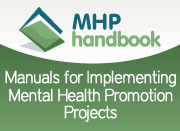Tools
- Utilities:
- Print this page
- Send this page
- Font size:
- Increase font size
- Decrease font size
Newsletter Issue No. 11
30/11/2009 - Submitted by: Tilia Bousios
Publisher: ProMenPol Consortium
ProMenPol Lives On
As you are aware, the ProMenPol team has been looking for opportunities to carry on the work of the project in a number of areas. We can now announce that we have been successful in securing two new projects which are concerned with mental health promotion in the three settings.
The first of these is T-MHP (Training for Mental Health Promotion) which has been funded by the Leonardo programme in Ireland. This two year project, which has just begun, will produce a set of e-learning courses in MHP targeted at each of the three ProMenPol settings of interest – schools, workplaces and older people’s residences. These courses will be available in multiple languages, and when the first versions of them are available next year, they will be accessible through the ProMenPol Portal.
The second project, which is due to start in the New Year, will produce a set of MHP handbooks or manuals, again aimed at the same three settings. Funded by DG Sanco, the MHP-Hands project will run for three years and will focus on supporting the practice of MHP in the settings of interest. It aims to build on the work of the field trials in ProMenPol and also to extend the geographical coverage of the ProMenPol to include more representation from the new Member States. This project will also produce a newsletter on a quarterly basis and will therefore follow up the work of this title. It will also be possible to follow the progress of this project through the ProMenPol site.
We believe that the work of ProMenPol in promoting MHP across Europe is of great importance and that we have already come a long way in highlighting the importance of the issue of MHP. We are therefore committed to developing the work even further in the coming years. To this end, the ProMenPol partners are also involved in a number of other proposals that are complementary to the work of the project. We hope to have some more news on these proposals soon and we will keep all of the ProMenPol network informed about these developments.
Knowledge and Policy for Mental Health in Scotland
A research team from the School of Social and Political Science at the University of Edinburgh are investigating how knowledge is used in mental health policy making in Scotland. This research forms part of the KNOWandPOL integrated project , a five year (2006-2011) European-wide study funded by the European Commission within the Sixth Framework Program (Project # 0288848-2)which is investigating the role of knowledge in health and education policy in eight European countries.
To date four research reports based on the Scottish mental health case study have been completed. These are:
- Scottish Mental Health Policy: Context and Analysis
The project began by mapping the field of mental health policy in Scotland through examining the individuals, organisations and knowledge which comprise the policy making community. This research consisted in a literature review and an extensive set of interviews. The report describes the way knowledge is produced, shared and used in the creation of mental health policy, as well as the institutional connections between those working in different organizations: The Social and Cognitive Mapping of Policy - Scotland Health Policy: Context and Analysis
Work from this stage of the project has also been published in the Mental Health Review Journal: Smith-Merry, J., R. Freeman and S. Sturdy, 2008, ‘Organising Mental Health in Scotland’ Mental Health Review Journal, 13(4):16-26.
- Consultation as Public Action: Towards a Mentally Flourishing Scotland
This report examines the way that knowledge was mobilised in the consultation process guiding the development of the National Programme for Improving Mental Health and Wellbeing in and which resulted in the policy statement Towards a Mentally Flourishing Scotland (TAMFS). This research involved observation of the main stages of the process, including local stakeholder events and meetings of the National Reference Group, interviews with key informants and analysis of documents. Towards A Mentally Flourishing Scotland: Consultation Process as Public Action
The focus of this part of the project was on the way knowledge is developed and communicated across countries, for which we took WHO’s 2005 Declaration and Action Plan for Mental Health in Europe as a case study. Two reports based on this research were produced:
A third phase of the project (2009-2010) is examining the concept of recovery in mental health policy Scotland and, separately, at the use of indicators of policy impact on mental health and well-being.
The research team have organised a number of feedback and training sessions and have distributed our findings widely within the mental health policy community in Scotland. For more information or to be added to the mailing list for project information please contact the research fellow for the project: Dr Jennifer Smith
More information can also be found at our project website
Lessons from the Field Trials
In the course of the ProMenPol project several organisations and institutions from different settings have conducted Field Trials of MHP tools or reported on prior mental health promotion (MHP) implementation experiences. The aim of the Field Trials was to obtain experiences from practice about the implementation of MHP tools.
Several pilot sites reported on the lessons learned during implementation. The responses from practice provide significant insights which can help to strengthen the mental health capacity of institutions and organisations. Furthermore, the feedback from various practices will help to strengthen the links between practice, science and policy in the field of mental health promotion and protection.
ProMenPol has received practice reports and implementation documentation from six schools, seven workplaces and three older people’s residences. A total of 16 reports are available, which provide valuable insights regarding people’s learning experiences and recommendations which can be drawn for policy and practice from the field.
The majority of implementing organisations and institutions had good or very good implementation experiences and most reported that their MHP initiative succeeded. The desired goals were achieved and the Field Trials reported a high level of acceptance for the MHP tools used. In addition, the target groups (pupils, employees or residents) reported high levels of satisfaction. Field Trial participants reported valuable and sustainable organisational changes, including positive effects on mental health and an increased sense of well-being among the individuals involved.
In addition to this Pilot Sites provided valuable feedback and lessons learned which yielded a remarkable amount of information:
In relation to the practice of MHP, the lessons learned are:
- Increased awareness and knowledge about mental health promotion
- The importance of using well designed and structured, user-friendly and easy to implement MHP initiatives
- The benefits of using project management techniques
- The need to tailor the intervention to the specific needs of your target group (respect the diversity of the target group and involve them in the planning if possible)
- Ensure high levels of participation
- Adapt the MHP tool as necessary (e.g. avoid overlapping with existing initiatives)
- Make sure you have enough preparation and implementation time and make a realistic schedule for the initiative
- Provide appropriate training, resources and available supportive and encouraging environment
- Seek the support and involvement of skilled staff
- Evaluate the MHP implementation on an continuous basis.
In relation to MHP policy, the lessons learned included:
- Ensure sufficient resources (e.g. skilled staff, training) and financial support (e.g. funding, grants) are available
- There is a need to have a developmental element to policy (e.g. parental work, staff support, counselling)
- There is a need for Mental Health education and curriculum development (e.g. primary and secondary schools but also for trainers in the field)
- Conduct awareness programmes about MHP (e.g. media campaigns such as anti-stigma)
- Find local MHP champions for policy initiatives
- Integrate MHP in physical activity programmes and in health and safety laws
- Support the development of co-operative relationships and networks between experts and practitioners in the field
- Promote a more widespread discussion about MHP and well-being issues in a larger context
These results reflect the first qualitative but structured experiences and reports from the implementation in practice of mental health promotion. They give a valuable insight into the implementation practice of schools, work places and residences for older people. The experiences, feedbacks and lessons learned from practice show that it is relatively easy to implement MHP tools.
In most cases MHP implementation was successful and promoted well-being in the beneficiaries. Maybe the most valuable are lessons learned which can help to improve practice in the long run. For this purpose actors on the policy, research and practice level can learn from the responses given from practice and must fit their work in a way that mental health promotion practice can profit from these adaptations.



